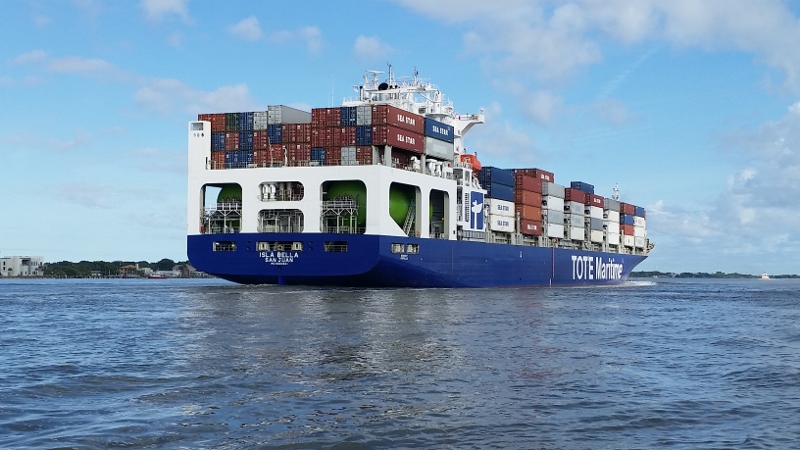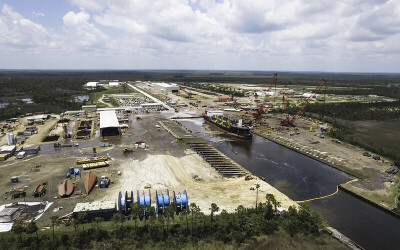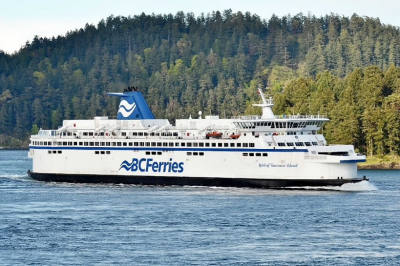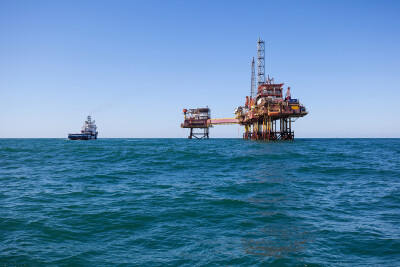U.S. flag cargo carriers say they are bringing the supplies needed to rebuild Puerto Rico, constrained only by continued logistical problems moving material out of port and around the island.
Spurred both by critics of the Jones Act and frustration with the pace of Hurricane Maria relief efforts, debate over the Merchant Marine Act of 1920 continues to flare.
Puerto Rico Gov. Ricardo Rossello unsuccessfully sought an extension of a 10-day waiver of the Jones Act, allowing foreign flag vessels to carry cargo from U.S. pots to the island. Department of Homeland Security officials declined to extend the waiver, saying there is sufficient U.S. flag shipping capacity.
"I think we should have it,” Rossello told CBS News Monday. “In this emergency phase, while we’re looking to sustain and save lives, we should have all of the assets at hand.”
In the days before, Jones Act operators went to Congress and news media to talk about their role in the recovery. TOTE Maritime’s Isla Bella, one of the company’s new 764’ Marlin-class containerships, arrived Oct. 1 in San Juan with 1,040 TEUs of cargo, Followed Oct. 6 by sistership Perla del Caribe with 1,060 TEUs, including bucket trucks for repairing utility lines, food, water, ice and fuel, the company said.
Shipping companies and the Federal Emergency Management Agency said they were working to speed up moving containers out of port facilities to stores and distribution centers on the island. Damaged roads and communications networks left the island’s trucking industry severely disrupted.
With the Jones Act under fire, the House Subcommittee on Coast Guard and Maritime Transportation held an Oct. 3 hearing that gave maritime companies and labor a platform o talk about their contributions to the Puerto Rico recovery. Crowley Maritime Corp. senior vice president Michael G. Roberts said the company is carrying significant weight for FEMA’s efforts since reopening its San Juan terminal Sept. 23.
“By the end of next week, we will have delivered about 7,500 loads (about 17,000 TEUs). This will include 3,200 FEMA loads,” which include water, military rations, generators and tarps, along with rolling stock like fuel and utility bucket trucks and other heavy equipment, said Roberts.
With cargo coming in faster than it could be moved out, “their main challenge has been to find places to put loads coming off the vessels, given the congestion on the docks,” said Roberts. “In contrast, the next links in the supply chain were severely damaged. Many roads were impassable; power lines were down; many people had to stabilize their family circumstances before returning to work; trucking needs have been very high, while tractors, drivers, and diesel fuel have been in short supply.”
“This reinforces the fact that waiving the Jones Act in order to increase the number of vessels able to bring cargo to the island will not help get cargo more quickly where it is needed on the island,” Roberts told the subcommittee.
“Not one bottle of water will reach disaster survivors any faster because of the waiver. Issuing a waiver in these circumstances usually means that foreign vessels, if they’re used at all, will simply take work away from American vessels and American crews.”
Longtime Jones Act critic Sen. John McCain, R-AZ, introduced legislation to permanently exempt Puerto Rico from the Jones Act cabotage requirements for cargo from U.S. mainland ports to the island be carried in U.S.-built and manned vessels.
McCain and allies, including Puerto Rico elected officials, contend that drives up the cost of living on the island. That argument resounded in news reports in the days after Hurricane Maria hit, and the maritime industry is pushing back.
Most of Puerto Rico’s fuel is delivered by foreign flag vessels, while U.S. carriers deliver most containerized goods, said Roberts. The relative higher cost of paying U.S. crews is a fraction of the costs incurred by all shippers, from port fees to stevedoring and trucking, and have scant effect on the price of consumer goods, he said.





